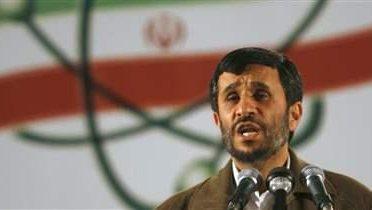Editor’s Note: For Campaign 2012, Suzanne Maloney wrote a policy brief proposing ideas for the next president on Iran. The following paper is a response to Maloney’s piece by Michael Doran. Shibley Telhami also prepared a response arguing that the next president must address the concerns of key regional actors as he works to contain Iran’s nuclear program.
Get audio and video from our Campaign 2012 event on Iran »
When analyzing “the centrality of Iran in the Republican narrative,” Suzanne Maloney insightfully points out that the presidential candidates are playing to their conservative base. Note, however, that they are simultaneously exploiting a key vulnerability in the Obama campaign, which is haunted by a vision of the Iranian prime minister, Mahmoud Ahmadinejad, standing next to a nuclear-tipped missile draped with banners and calling for the destruction of the United States and Israel. Surrounded by stern mullahs, imposing generals, and white-coated nuclear technicians, he has a broad smile on his face. Preventing this from happening—or allowing it—is the most consequential decision that President Barack Obama faces in this election year.
For the past eight years Americans have heard from two presidents that an Iranian nuclear weapon is “unacceptable.” Yet with each passing day they are closer to witnessing a celebration in Tehran. The Iranian centrifuges have been slowed by international sanctions and covert sabotage. Nevertheless, they continue to spin, and the stockpiles of enriched uranium steadily grow. According to Secretary of Defense Leon Panetta, Iran will have the capability to build a weapon within a year or two—even faster if its supplies of enriched uranium are augmented by a foreign source. Panetta also says of the Iranians, “If they proceed and we get intelligence that they are proceeding with developing a nuclear weapon, then we will take whatever steps necessary to stop it.”
The implications are grave. President Obama will be forced either to accept the rise of a nuclear Iran or to launch a war to stop it. This is not a decision that this president—or, for that matter, any president—wants to make. But, above all, it is not a decision that Obama wants to make before November.
If Iran succeeds in gaining the use of nuclear weapons, Obama’s foreign policy will be fundamentally undermined, making him vulnerable to Republican attacks. The president summarized his achievements in the opening moments of the State of the Union address: “For the first time in nine years,” there are no Americans fighting in Iraq. For the first time in two decades, Osama bin Laden is not a threat to this country. Most of al Qaeda’s top lieutenants have been defeated. The Taliban’s momentum has been broken, and some troops in Afghanistan have begun to come home.” Boiled down to its essence, these statements tell a simple story that epitomizes the administration’s policy toward the Middle East: “By accepting limited goals, dialing back American pretensions, and focusing on counterterror tactics, I won the war against al Qaeda and brought the troops home.”
The apparent success of this approach protects the president from attack when the Republicans trot out their perennial accusation that Democrats are soft on defense. In fact, Obama has already been defending himself effectively. During a White House press conference in December 2011, the president was asked about the GOP candidates’ accusation that he is an appeaser in the Middle East. “Ask Osama bin Laden and the twenty-two of top thirty al Qaeda leaders who have been taken off the field whether I engage in appeasement. . . . Ask them about that,” said Obama.
It was a good answer, not only because the counterterror tactics have worked, but also because they shift attention away from war. The White House and its allies have nixed proposals for ticker tape parades for the returning troops. Obama is running not on victory in either Iraq or Afghanistan but, rather, on extrication. As the nation heads into the general election, his message will go something like this: “I got us out of the mess that my predecessor created. I am putting some distance between us and the Middle East and, therefore, we are safer.”
In many ways, this is a better story to tell than victory. In a year when the perilous state of the economy will dominate the election, it sends the right message about priorities: “I’m focused on our problems here.” It also insulates the president from the growing instability in Iraq. Some of the president’s critics believe that if Iraq falls into civil war—a very real possibility—the mess can be laid at his doorstep. They are wrong. Chaos will simply reinforce the basic wisdom of the decision to cut losses and pull back. In fact, bad news from anywhere in the Middle East strengthens the president.
From anywhere, that is, but Iran. The Islamic Republic with nuclear weapons undermines Obama’s message. For more than thirty years, Tehran has been working hard to establish itself in the American mind as a wily, malevolent, and dangerous villain. Some Iran experts reject this image, dismissing it as a pernicious caricature. Regardless of the merits of their position, the image exists. Americans will regard a nuclear Iran—or even a nearly nuclear Iran—as a direct threat to their personal security (and to the security of Israel, which is a deep concern to them).
The campaign’s goal, therefore, is to keep Iran out of the headlines until after November. But this may prove impossible, because the centrifuges continue to spin and the Israelis are planning—also according to Panetta—to attack Iranian nuclear facilities in the spring of 2012.
The electoral calendar in the United States may well be influencing the Israelis’ timing. It cannot have escaped notice in Jerusalem that Israel loses leverage over the United States if Obama is reelected. After the election, the president can continue to play for time: delaying the decision to take drastic action and at the same time forcing restraint on Israel. By contrast, if the Israelis push ahead with their plan to attack in the spring, they will compel Obama to make a clear decision.
The Israeli plan gives Obama three stark options: to restrain Israel, unleash it, or launch an attack himself. These all work against the administration’s efforts to make the extrication of troops from Iraq and Afghanistan the big and politically beneficial achievement of its Middle Eastern policy. The simplest solution for the president would be to persuade the Israelis, behind the scenes, to hold off. But if he tries, word will get out. The last thing Obama needs in a closely contested election is a debate about whether he is shielding Iran and placing Israel in harm’s way. That debate will cast him as an appeaser, even if he did kill Osama bin Laden and his deputies. Were it not for Iran’s relentless pursuit of nuclear weapons, Obama would have a good story to tell on foreign policy.
The Brookings Institution is committed to quality, independence, and impact.
We are supported by a diverse array of funders. In line with our values and policies, each Brookings publication represents the sole views of its author(s).




